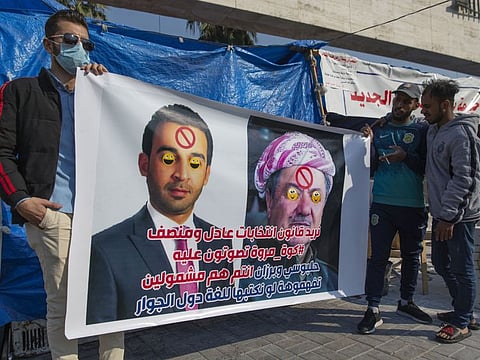Does Iraq's new election law meet protesters' demands? The answer is no.
Candidates can run as independents but rejoin political parties once elections are over

Also In This Package
Baghdad: The Iraqi Parliament made good on its promise to overhaul the country’s election laws, voting on Tuesday to make sweeping changes in how lawmakers are elected, seemingly in response to demands from protesters to give citizens a greater voice.
The law does away with voting for lists of candidates grouped by party and replaces it with voting for individuals, which would seem to lessen the influence of political parties seen by protesters as corrupt.
But within hours of its passage, criticism began to roll in from legal experts, intellectuals and the Iraqi street suggesting that the law might not work as advertised.
By midnight a banner was flying in Tahrir Square, the epicenter of the protests, saying: “Let them not cheat you: The election law does not represent us.”
Legislators defended the new law, insisting that they were doing the will of the protesters.
“The political blocs listened to the demands of the demonstrators and carried out a peaceful coup upon themselves by passing the election law,” said Wajih Abbas, a lawmaker from Sadiqoon, the party led by Qais Al Khazali, who is viewed as close to Iran.
The populist political and religious leader Muqtada Al Sadr, whose political bloc is one of Iraq’s largest, tweeted support for the law, describing it as a “first step on the path of reforms.”
Tens of thousands of his followers have been in the streets for months, pushing for many of the changes the new law purports to include.
But already, doubts have emerged over how the law would be put into practice.
Abbas Kadhim, the director of the Iraq Initiative and a senior fellow at the Atlantic Council, said the measure has created something “similar to a congressional system, but Iraq’s system is parliamentary.”
“It is like having a Volkswagen bug and deciding it needs a new engine and you get the best - an engine for a Ferrari - but the two don’t work together,” said Kadhim, a longtime observer of the Iraqi political system.
Chance for parties to regroup
The new law would divide Iraq into districts, with a member of Parliament elected from each.
It is not clear how many people would be in each district - and there has not been a census in more than 20 years so no one really knows how many people live in any given area.
Perhaps the bigger issue is that once representatives get to Parliament, according to the Iraqi Constitution, they will have to form political parties in order to choose a prime minister.
What could easily happen, Kadhim said, is that the parties will send representatives to run as individuals in districts around Iraq, injecting money and other support into the campaigns as needed.
The parliamentary blocs will simply regroup once the elections are over.
“Then it will go back to the status quo,” Kadhim said.
The status quo is exactly what drew demonstrators into the streets in October when they first gathered to protest a lack of jobs and services, and the failure of Parliament to respond to Iraqi citizens.
Street getting angier
After the government opened fire on demonstrators, killing more than 100 people in the first five days of protests, the number of people taking to the streets multiplied and they began to agitate for more far-reaching changes that would rid the system of the political parties that many see as the cause of government corruption.
Many of those parties are also close to Iran or indebted to it for support. For the protesters, reducing Iran’s influence and holding early elections have become a rallying cry.
More than 500 people have been killed in all during the three months of protests, and about 19,000 have been wounded.
Early elections look unlikely, however, because the law is silent on how electoral districts will be formed or who will designate them. Figuring out how that will work could take months or longer, said Tariq Harb, an expert on the Iraqi Constitution and legal system.
“The technical complications related to identifying new districts, thousands of them across the country, means there will not be early elections,” Harb said.
Sign up for the Daily Briefing
Get the latest news and updates straight to your inbox




